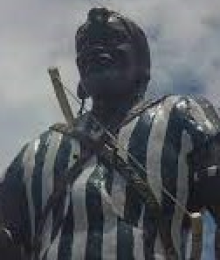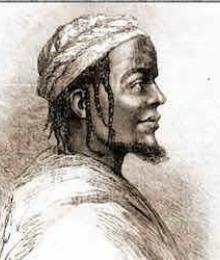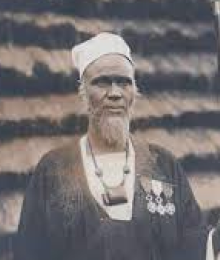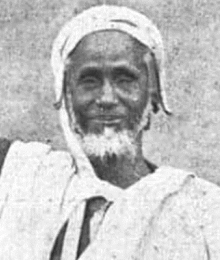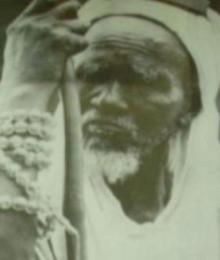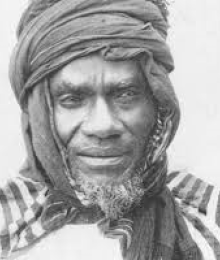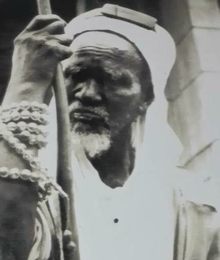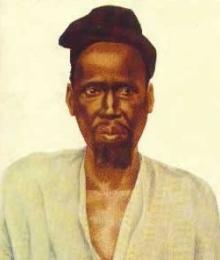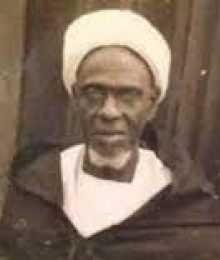
Cheick Fanta-Madi Cherif was an eminent Guinean Muslim scholar born in 1870 in Kankan, hailing from a prestigious family of marabouts. Known as Kankan-Sékouba, he was renowned for his profound erudition in theology, Quranic law, philosophy, and social sciences, and was regarded as a spiritual guide respected far beyond the borders of Guinea. Son of Karamoko Aboubacar Sidiki Chérif, spiritual advisor to Almamy Samory Touré, he was famous for his exceptional religious tolerance, notably facilitating the welcome of the first Christian catechists in Kankan.
His reputation as a prophetic marabout was built through his remarkable predictions, such as the independence of Ghana and the Allied victory during World War II. An influential personality, he was regularly consulted by important political figures like Kwame Nkrumah and Ahmed Sékou Touré, transforming Kankan into a pilgrimage site where Muslims and non-Muslims came to seek his blessings. He passed away on September 8, 1955, in his hometown, leaving behind a spiritual and cultural legacy deeply rooted in the history of West Africa.
Introduction
Born in 1870 in Kankan, Guinea, Cheick Fanta-Madi Cherif emerged from a prestigious lineage of marabouts. The son of Karamoko Aboubacar Sidiki Chérif, an influential spiritual advisor to Almamy Samory Touré, and Fanta Condé from Côte d'Ivoire, he embodied the intellectual and spiritual heritage of a respected family.
Education and Scholarship
From a young age, Fanta-Madi Chérif, nicknamed Kankan-Sékouba, benefited from an exceptional intellectual formation provided by his father, Karamoko Aboubacar Sidiki Chérif, himself a respected marabout and spiritual advisor to Almamy Samory Touré. This early and rigorous education laid the foundations for a remarkable scholarship that would quickly transcend the traditional boundaries of religious teachings.
His academic journey was distinguished by its depth and diversity. Driven by an insatiable thirst for knowledge, he delved deeply into fields as varied as Islamic theology, Quranic law, philosophy, and social and political sciences. This multidisciplinary approach was rare for the time and testified to his intellectual curiosity and open-mindedness.
His exceptional mastery of these different disciplines earned him significant academic and spiritual recognition. Scholars of his time bestowed upon him the honorific title of "Fodé", a term literally meaning "doctor of Quranic sciences". This was not merely an honorary title, but reflected his profound understanding and expertise in religious and intellectual domains, making him one of the most respected scholars in West Africa during the late 19th and early 20th centuries.
Spiritual and Social Influence
Cheick Fanta-Madi Cherif's spiritual influence extended far beyond local boundaries. Under his guidance, Kankan became a unique spiritual center, transcending geographical and religious frontiers. The city was no longer just a point on the map, but a pilgrimage site where followers from different traditions converged, drawn by the promise of his powerful blessings and extraordinary wisdom.
His reputation far exceeded Guinea's borders, attracting Muslim and non-Muslim pilgrims seeking advice, comfort, and blessings. Important personalities like Kwame Nkrumah and Ahmed Sékou Touré traveled to meet him, demonstrating an influence that extended well beyond traditional religious circles.
What made Cheick Fanta-Madi Cherif truly exceptional was his religious tolerance, rare for his time. Notably, he played a crucial role in welcoming the first Christian catechists to Kankan, demonstrating a breadth of mind that defied usual religious divisions. This inclusive approach was revolutionary, transforming Kankan into a model of inter-religious dialogue and mutual understanding. His attitude perfectly illustrated his vision of an open, tolerant, and humanistic Islam, capable of transcending cultural and religious differences to promote peace and understanding.
Political Influences and Prophecies
Cheick Fanta-Madi Cherif's political influence extended far beyond the spiritual realm, reaching the circles of political decision-makers of his era. His reputation as a seer and wise counselor attracted major political figures, most notably Kwame Nkrumah and Ahmed Sékou Touré.
He reportedly predicted Ghana's imminent independence to Nkrumah, while for Sékou Touré, whom he regularly received, he sensed a destiny of great leadership, surrounding him with a prophetic aura.
His political foresight did not stop there: it is reported that he had anticipated the Allies' victory over Germany early in World War II, demonstrating a geopolitical perception that transcended local considerations. These prophecies, blending political intuition and spiritual wisdom, contributed to building his legend and influence in the region.
Legacy and Recognition
Cheick Fanta-Madi Cherif's legacy far surpasses official distinctions, but his institutional recognition was nonetheless significant. In 1955, the same year of his death, he was made Commander of the Order of Nichan el-Anouar, an honorary distinction symbolizing recognition of his immense spiritual, social, and intellectual contribution.
This official recognition crowned a lifetime dedicated to scholarship, tolerance, and the influence of Islam in West Africa. Beyond this honor, his true legacy lies in his ability to transcend religious divides, to be a respected advisor to the great leaders of his time, and to make Kankan a center of wisdom and open-mindedness. His memory continues to inspire generations, representing a model of spiritual leadership imbued with tolerance, knowledge, and wisdom.
End of Life
Cheick Fanta-Madi Cherif died on September 8, 1955, in Kankan, his hometown. His mausoleum is located in the very room where he used to pray, testifying to his profound spiritual connection to this place.
Conclusion
More than just a scholar, Cheick Fanta-Madi Cherif represented the soul of an era: a tolerant, open, and profoundly humanistic Islam. His legacy continues to inspire generations of Muslims in West Africa.











